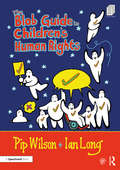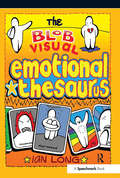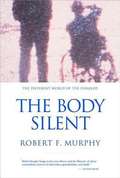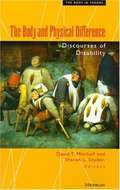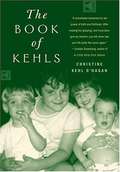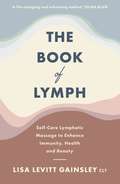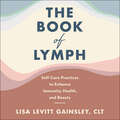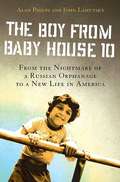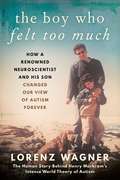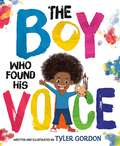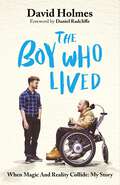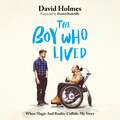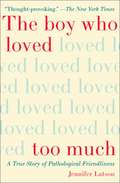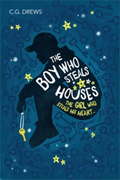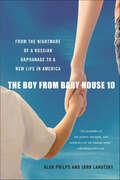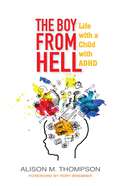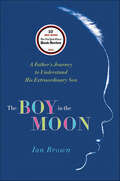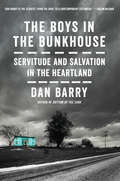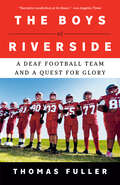- Table View
- List View
The Blind Outlaw
by Glen RoundsAfter a beautiful blind horse is caught with a band of range horses, a young boy at the ranch, who cannot speak, takes on the task of training the colt. Can a mute boy save a blind horse?
The Blind Preschool Child
by Berthold LowenfeldThis book is a collection of papers presented at the National Conference On The Blind Preschool Child on March 13-15, 1947.
The Blind in School and Society: A Psychological Study
by Thomas D. CutsforthThe purpose of this book is to help acquaint the seeing with the blind and the blind with themselves.
The Blob Guide to Children’s Human Rights
by Pip Wilson Ian LongThis practical resource is designed to support children and young people as they develop an understanding of the basic rights that we are all entitled to as humans. Diverse and inclusive, Blob figures have proven themselves to be a valuable way of sparking discussion of difficult topics through the universal means of body language and feelings. Based upon the UN Convention on the Rights of the Child, this book introduces 'Blob Trees', lines and images with prompt questions and activities to help children to consider concepts such as freedom of movement and speech, safety and equality. It encourages children to think about the ways in which they can apply human rights articles to their own lives, by treating others with kindness, fairness and respect. Key features include: ‘How to use’ guides and prompt questions for each topic Simplified and child-friendly versions of all 42 human rights articles Photocopiable and downloadable worksheets designed to be used with individuals and groups of all sizes. With clear and supportive guidance and a graduated approach, this is an essential tool for teachers and practitioners looking to support an understanding of human rights in children and young people. It will also be invaluable for any groups wishing to develop accreditation for UNICEF’s ‘Rights Respecting Schools’ Awards.
The Blob Visual Emotional Thesaurus (Blobs)
by Ian LongThis unique visual thesaurus is designed to help writers of all ages to develop their emotional literacy. The book focuses solely upon emotions. Spanning circa 140 emotional words it is divided into three sections: ranges of emotions (offering a visual spectrum to be referred to by writers unsure of the intensity of feelings), synonyms (each image has similar images and words underneath it along with a sentence to help a new writer see how it can be embedded into a story), and antonyms - opposite pairs of feelings that are useful when wishing to create contrast in a storyline. This book will be a vital reference for every classroom and can be used individually or in whole class activities. Ian Long has worked as an artist with children, youth and adults. He has been a youth and children's worker in Gloucestershire, an artist-in-residence in Lambeth and is currently a teacher in a school in Marlborough. He is married to Jane and enjoys life with their two girls. Ian has illustrated many books for Pip.
The Body Silent: The Different World of the Disabled
by Robert F. MurphyWinner of the Columbia University Lionel Trilling Award. Robert Murphy was in the prime of his career as an anthropologist when he felt the first symptom of a malady that would ultimately take him on an odyssey stranger than any field trip to the Amazon: a tumor of the spinal cord that progressed slowly and irreversibly into quadriplegia. In this gripping account, Murphy explores society's fears, myths, and misunderstandings about disability, and the damage they inflict. He reports how paralysis, like all disabilities, assaults people's identity, social standing, and ties with others, while at the same time making the love of life burn even more fiercely.
The Body and Physical Difference: Discourses of Disability
by David T. Mitchell Sharon L. SnyderFor years the subject of human disability has engaged those in the biological, social and cognitive sciences, while at the same time, it has been curiously neglected within the humanities.The Body and Physical Difference seeks to introduce the field of disability studies into the humanities by exploring the fantasies and fictions that have crystallized around conceptions of physical and cognitive difference. Based on the premise that the significance of disabilities in culture and the arts has been culturally vexed as well as historically erased, the collection probes our society's pathological investment in human variability and "aberrancy." The contributors demonstrate how definitions of disability underpin fundamental concepts such as normalcy, health, bodily integrity, individuality, citizenship, and morality--all terms that define the very essence of what it means to be human. The book provides a provocative range of topics and perspectives: the absence of physical "otherness" in Ancient Greece, the depiction of the female invalid in Victorian literature, the production of tragic innocence in British and American telethons, the reconstruction of Civil War amputees, and disability as the aesthetic basis for definitions of expendable life within the modern eugenics movement. With this new, secure anchoring in the humanities, disability studies now emerges as a significant strain in contemporary theories of identity and social marginality. Moving beyond the oversimplification that disabled people are marginalized and made invisible by able-ist assumptions and practices, the contributors demonstrate that representation is founded upon the perpetual exhibition of human anomalies. In this sense, all art can be said to migrate toward the "freakish" and the "grotesque." Such a project paradoxically makes disability the exception and the rule of the desire to represent that which has been traditionally out-of-bounds in polite discourse. The Body and Physical Difference has relevance across a wide range of academic specialties such as cultural studies, the sociology of medicine, history, literature and medicine, the allied health professions, rehabilitation, aesthetics, philosophical discourses of the body, literary and film studies, and narrative theory. David T. Mitchell is Assistant Professor of English, Northern Michigan University. Sharon L. Snyder teaches film and literature at Northern Michigan University.
The Book of Kehls
by Christine Kehl O'HaganIn this memoir, the author recounts her family history and the ways it was shaped by muscular dystrophy. Two uncles died of the disease in 1922; her brother Richie died in the 1960s; and her own son, Jamie, died six years before this book was written. O'Hagan describes the ways this history of loss affected her boisterous Irish family. The book's main focus is Jamie's illness and death, and her anguished battle with guilt and grief.
The Book of Lymph: Self-care Lymphatic Massage to Enhance Immunity, Health and Beauty
by Lisa Levitt GainsleyThe Book of Lymph will give you quick, easy and therapeutic lymph-optimisation strategies, using the simple healing magic of your own touch.The lymphatic system is the body's first line of defence against illness and is responsible for ridding the body of toxins, waste and other unwanted materials. When it's not functioning well, it's easy to see and feel the bloat, puffiness and general malaise it causes. Lisa Levitt Gainsley combines her 25 years of experience as a lymph specialist with scientific know-how to show us how lymphatic treatment is the missing link to our most common health woes. She shows us how lymphatic drainage can provide us with pain relief, inflammation reduction, weight loss, brighter skin and generally better health. From three-to-five-minute massage sequences to backed-up research into the effectiveness of lymphatic drainage, The Book of Lymph will put you on the path to taking control of how you feel, reducing bloating and puffiness independently. The first book of its kind, The Book of Lymph will help you to live a pain-free life.'Well-functioning lymphatic drainage is the key to great, clear, glowing skin.' - Vogue 'I am so grateful Lisa is sharing her wisdom and techniques with us. Truly a life-changing and enhancing method.' - Selma Blair, Actress'Lisa's lymphatic self-massage techniques have changed my life and my body dramatically - specifically by reducing chronic pain symptoms and helping to balance out my hormones.' - Jessica Zanotti'I am beyond thrilled for the world to get a dose of Lisa's kind and gentle, but powerful and life-changing knowledge and be equipped to try some of it out on their own bodies.' - Freida Pinto, Actress
The Book of Lymph: Self-care Lymphatic Massage to Enhance Immunity, Health and Beauty
by Lisa Levitt GainsleyThe Book of Lymph harnesses the power of lymphatic massage for self-healing from renowned specialist Lisa Levitt Gainsley.The Book of Lymph will give you quick, easy and therapeutic lymph-optimisation strategies, using the simple healing magic of your own touch.The lymphatic system is the body's first line of defence against illness and is responsible for ridding the body of toxins, waste and other unwanted materials. When it's not functioning well, it's easy to see and feel the bloat, puffiness and general malaise it causes. Lisa Levitt Gainsley combines her 25 years of experience as a lymph specialist with scientific know-how to show us how lymphatic treatment is the missing link to our most common health woes. She shows us how lymphatic drainage can provide us with pain relief, inflammation reduction, weight loss, brighter skin and generally better health. From three-to-five-minute massage sequences to backed-up research into the effectiveness of lymphatic drainage, The Book of Lymph will put you on the path to taking control of how you feel, reducing bloating and puffiness independently. The first book of its kind, The Book of Lymph will help you to live a pain-free life.(P)2021 HarperCollins Publishers
The Boy From Baby House 10: From the Nightmare of a Russian Orphanage to a New Life in America
by Alan Philps John LahutskyIn 1990, a young boy afflicted with cerebral palsy was born, prematurely, in Russia. His name was Vanya. His mother abandoned him to the state childcare system and he was sent to a bleak orphanage called Baby House 10. Once there, he entered a nightmare world he was not to leave for more than eight years. Housed in a ward with a group of other children, he was clothed in rags, ignored by most of the staff and given little, if any, medical treatment. He was finally, and cruelly, confined for a time to a mental asylum where he lived, almost caged, lying in a pool of his own waste on a locked ward surrounded by psychotic adults. But, that didn't stop Vanya. Even in these harsh conditions, he grew into a smart and persistent young boy who reached out to everyone around him. Two of those he reached out to-Sarah Philps, the wife of a British journalist, and Vika, a young Russian woman-realized that Vanya was no ordinary child and they began a campaign to find him a home. After many twists and turns, Vanya came to the attention of a single woman living in the United States named Paula Lahutsky. After a lot of red tape and more than one miracle, Paula adopted Vanya and brought him to the U. S. where he is now known as John Lahutsky, an honors student at Freedom High School in Bethlehem, Pennsylvania and a member of the Boy Scouts of America Order of the Arrow. In The Boy From Baby House 10, Sarah's husband, Alan Philps, helps John Lahutsky bring this inspiring true-life story of a small boy with a big heart and an unquenchable will to readers everywhere.
The Boy Who Felt Too Much: How a Renowned Neuroscientist and His Son Changed Our View of Autism Forever
by Lorenz WagnerAn International Bestseller, the Story behind Henry Markram&’s Breakthrough Theory about Autism, and How a Family&’s Unconditional Love Led to a Scientific Paradigm Shift Henry Markram is the Elon Musk of neuroscience, the man behind the billion-dollar Blue Brain Project to build a supercomputer model of the brain. He has set the goal of decoding all disturbances of the mind within a generation. This quest is personal for him. The driving force behind his grand ambition has been his son Kai, who has autism. Raising Kai made Henry Markram question all that he thought he knew about neuroscience, and then inspired his groundbreaking research that would upend the conventional wisdom about autism, expressed in his now-famous theory of Intense World Syndrome. When Kai was first diagnosed, his father consulted studies and experts. He knew as much about the human brain as almost anyone but still felt as helpless as any parent confronted with this condition in his child. What&’s more, the scientific consensus that autism was a deficit of empathy didn&’t mesh with Markram&’s experience of his son. He became convinced that the disorder, which has seen a 657 percent increase in diagnoses over the past decade, was fundamentally misunderstood. Bringing his world-class research to bear on the problem, he devised a radical new theory of the disorder: People like Kai don&’t feel too little; they feel too much. Their senses are too delicate for this world.
The Boy Who Found His Voice
by Tyler GordonFrom teen activist and artistic prodigy Tyler Gordon comes a heartwarming picture book inspired by his own life about a boy with a speech difference who learns the power of self-expression through art.There once was a young boy who had trouble with words. He paused and stuttered and stammered, which made school really tough. But with encouragement from his mom and a paintbrush in hand, he learns that finding your voice isn’t about being perfect—it’s about being true to yourself.For fans of I Talk Like a River and Amanda Gorman, The Boy Who Found His Voice is a joyful and empowering testament to art, empathy, and having self-confidence even in the face of doubt.Don't miss Tyler Gordon's bold picture book debut We Can: Portraits of Power.
The Boy Who Lived: When Magic and Reality Collide: my story, with a foreword by Daniel Radcliffe
by David HolmesTHE POWERFUL MEMOIR FROM HARRY POTTER STUNTMAN DAVID HOLMES, WITH A FOREWORD BY DANIEL RADCLIFFE: AVAILABLE TO PRE-ORDER NOW! As stunt double to Daniel Radcliffe in the Harry Potter film franchise, stuntman David Holmes helped to move J.K. Rowling's era-defining story from the page to the big screen. His work as a real-life Fall Guy enabled him to create some of the most memorable action sequences in the Wizarding World, as he became the first person ever to play Quidditch. In living his own hero's journey, David was also one of only a handful of people to have worn the iconic wizard's cape, glasses and scar in front of the cameras.That is, until an accident changed his life forever.During the making of Harry Potter and the Deathly Hallows: Part 1, David broke his neck in a stunt rehearsal and was instantly paralysed. From talented junior gymnast and stunt prodigy to fully qualified Hollywood stuntman, his story is a brutally honest portrait of a man who lost everything but found different ways to reimagine new possibilities with love, friendship and optimism - and he later co-created a BAFTA-nominated documentary about his life. David's behind-the-scenes look at one of the biggest film series of all time is both jaw-dropping and hilarious.Powerful and emotional, his is a story of hope and vulnerability and paints a picture of what it truly takes to rebuild a life and become The Boy Who Lived.
The Boy Who Lived: When Magic and Reality Collide: my story, with a foreword by Daniel Radcliffe
by David HolmesTHE INSPIRATIONAL MEMOIR FROM HARRY POTTER STUNTMAN DAVID HOLMES, WITH A FOREWORD BY DANIEL RADCLIFFE: PERFECT FOR HARRY POTTER FANS As stunt double to Daniel Radcliffe in the Harry Potter film franchise, stuntman David Holmes helped to move J.K. Rowling's era-defining story from the page to the big screen. His work as a real-life Fall Guy enabled him to create some of the most memorable action sequences in the Wizarding World, as he became the first person ever to play Quidditch. In living his own hero's journey, David was also one of only a handful of people to have worn the iconic wizard's cape, glasses and scar in front of the cameras.That is, until an accident changed his life forever.During the making of Harry Potter and the Deathly Hallows: Part 1, David broke his neck in a stunt rehearsal and was instantly paralysed. From talented junior gymnast and stunt prodigy to fully qualified Hollywood stuntman, his story is a brutally honest portrait of a man who lost everything but found different ways to reimagine new possibilities with love, friendship and optimism - and he later co-created a BAFTA-nominated documentary about his life. David's behind-the-scenes look at one of the biggest film series of all time is both jaw-dropping and hilarious.Powerful and emotional, his is a story of hope and vulnerability and paints a picture of what it truly takes to rebuild a life and become The Boy Who Lived. --------------'Brutally honest, utterly engaging, deeply sad yet incredibly uplifting. A must-read.' ⭐⭐⭐⭐⭐ 'A million stars for this incredible book.' ⭐⭐⭐⭐⭐ 'A beautifully authentic story and I'm a better person for having read it.' ⭐⭐⭐⭐⭐ 'I'm not normally a reader, but I managed to finish this book in two days. A spectacular piece of writing!'⭐⭐⭐⭐⭐
The Boy Who Lived: When Magic and Reality Collide: my story, with a foreword by Daniel Radcliffe
by David HolmesTHE INSPIRATIONAL MEMOIR FROM HARRY POTTER STUNTMAN DAVID HOLMES: PERFECT FOR HARRY POTTER FANS.NARRATED BY THE AUTHOR, WITH A FOREWORD BY DANIEL RADCLIFFE NARRATED BY TOBY LAURENCE.As stunt double to Daniel Radcliffe in the Harry Potter film franchise, stuntman David Holmes helped to move J.K. Rowling's era-defining story from the page to the big screen. His work as a real-life Fall Guy enabled him to create some of the most memorable action sequences in the Wizarding World, as he became the first person ever to play Quidditch. In living his own hero's journey, David was also one of only a handful of people to have worn the iconic wizard's cape, glasses and scar in front of the cameras.That is, until an accident changed his life forever.During the making of Harry Potter and the Deathly Hallows: Part 1, David broke his neck in a stunt rehearsal and was instantly paralysed. From talented junior gymnast and stunt prodigy to fully qualified Hollywood stuntman, his story is a brutally honest portrait of a man who lost everything but found different ways to reimagine new possibilities with love, friendship and optimism - and he later co-created a BAFTA-nominated documentary about his life. David's behind-the-scenes look at one of the biggest film series of all time is both jaw-dropping and hilarious.Powerful and emotional, his is a story of hope and vulnerability and paints a picture of what it truly takes to rebuild a life and become The Boy Who Lived.
The Boy Who Loved Too Much: A True Story of Pathological Friendliness
by Jennifer LatsonThe poignant story of a boy’s coming-of-age complicated by Williams syndrome, a genetic disorder that makes people biologically incapable of distrust.What would it be like to see everyone as a friend? Twelve-year-old Eli D’Angelo has a genetic disorder that obliterates social inhibitions, making him irrepressibly friendly, indiscriminately trusting, and unconditionally loving toward everyone he meets. It also makes him enormously vulnerable. Eli lacks the innate skepticism that will help his peers navigate adolescence more safely—and vastly more successfully. Journalist Jennifer Latson follows Eli over three critical years of his life as his mother, Gayle, must decide whether to shield Eli entirely from the world and its dangers or give him the freedom to find his own way and become his own person. By intertwining Eli and Gayle’s story with the science and history of Williams syndrome, the book explores the genetic basis of behavior and the quirks of human nature. More than a case study of a rare disorder, however, The Boy Who Loved Too Much is a universal tale about the joys and struggles of raising a child, of growing up, and of being different.
The Boy Who Saw Too Much (Romeo Riley, Private Eye #1)
by April M. WhittRomeo solves a mystery, gets into mischief, and enjoys his life despite his disabilities. R.L. 3.0
The Boy Who Steals Houses
by C.G. DrewsCan two broken boys find their perfect home? By turns heartbreaking and heartwarming, this is a gorgeously told, powerful story.Sam is only fifteen but he and his autistic older brother, Avery, have been abandoned by every relative he's ever known. Now Sam's trying to build a new life for them. He survives by breaking into empty houses when their owners are away, until one day he's caught out when a family returns home. To his amazement this large, chaotic family takes him under their wing - each teenager assuming Sam is a friend of another sibling. Sam finds himself inextricably caught up in their life, and falling for the beautiful Moxie. But Sam has a secret, and his past is about to catch up with him.Heartfelt storytelling, perfect for fans of Jandy Nelson and Jennifer Niven.
The Boy Who Steals Houses
by C.G. DrewsCan two broken boys find their perfect home? By turns heartbreaking and heartwarming, this is a gorgeously told, powerful story.Sam is only fifteen but he and his autistic older brother, Avery, have been abandoned by every relative he's ever known. Now Sam's trying to build a new life for them. He survives by breaking into empty houses when their owners are away, until one day he's caught out when a family returns home. To his amazement this large, chaotic family takes him under their wing - each teenager assuming Sam is a friend of another sibling. Sam finds himself inextricably caught up in their life, and falling for the beautiful Moxie. But Sam has a secret, and his past is about to catch up with him.Heartfelt storytelling, perfect for fans of Jandy Nelson and Jennifer Niven.
The Boy from Baby House 10: From the Nightmare of a Russian Orphanage to a New Life in America
by Alan Philps John LahutskyIn 1990, a young boy afflicted with cerebral palsy was born, prematurely, in Russia. His name was Vanya. His mother abandoned him to the state childcare system and he was sent to a bleak orphanage called Baby House 10. Once there, he entered a nightmare world he was not to leave for more than eight years. Housed in a ward with a group of other children, he was clothed in rags, ignored by most of the staff and given little, if any, medical treatment. He was finally, and cruelly, confined for a time to a mental asylum where he lived, almost caged, lying in a pool of his own waste on a locked ward surrounded by psychotic adults. But, that didn't stop Vanya. Even in these harsh conditions, he grew into a smart and persistent young boy who reached out to everyone around him. Two of those he reached out to—Sarah Philps, the wife of a British journalist, and Vika, a young Russian woman—realized that Vanya was no ordinary child and they began a campaign to find him a home. After many twists and turns, Vanya came to the attention of a single woman living in the United States named Paula Lahutsky. After a lot of red tape and more than one miracle, Paula adopted Vanya and brought him to the U.S. where he is now known as John Lahutsky, an honors student at Freedom High School in Bethlehem, Pennsylvania and a member of the Boy Scouts of America Order of the Arrow. In The Boy From Baby House 10, Sarah's hus band, Alan Philps, helps John Lahutsky bring this inspiring true-life story of a small boy with a big heart and an unquenchable will to readers everywhere.
The Boy from Hell: Life with a Child with ADHD
by Rory Bremner Alison M. ThompsonFor Alison, life with her son Daniel sometimes seemed like an endless round of difficulties: disobedience, backchat, rudeness, name-calling and aggression. Upon starting school, where his aggression and lack of concentration concerned teachers, Daniel was given a vague diagnosis of borderline Attention Deficit Hyperactivity Disorder (ADHD), which was later changed to ADHD with secondary Oppositional Defiant Disorder and autistic traits. In this honest account of the first 18 years of Daniel's life, Alison exposes her own worries, doubts, and exceptional courage at every pivotal turn in Daniel's life. Interspersing the narrative with tips and advice on what she has found useful - or not - in bringing up Daniel, Alison also provides encouraging guidance for teachers and fellow parents. This book also raises serious questions about how the education system supports children with special needs, and if medication can be the answer to managing ADHD in children.
The Boy in the Moon: A Father's Journey to Understand His Extraordinary Son
by Ian Brown“The truth Brown learns from his severely disabled child is a rare one: The life that seems to destroy you is the one you long to embrace.” —New York Times Book ReviewIan Brown’s son Walker is one of only about 300 people worldwide diagnosed with cardiofaciocutaneous (CFC) syndrome—an extremely rare genetic mutation that results in unusual facial appearance, the inability to speak, and a compulsion to hit himself constantly. At age thirteen, he is mentally and developmentally between one and three years old and will need constant care for the rest of his life.Brown travels the globe, meeting with genetic scientists and neurologists as well as parents, to solve the questions Walker’s doctors can’t answer. In his journey, he offers an insightful critique of society’s assumptions about the disabled, and he discovers a connected community of families living with this illness. As Brown gradually lets go of his self-blame and hope for a cure, he learns to accept the Walker he loves, just as he is.Honest, intelligent, and deeply moving, The Boy in the Moon explores the value of a single human life.“Candid . . . heartwrenching. . . . Much more than a moving journal of life with a disabled child; it is about Brown’s quest to understand his son and his son’s condition . . . An absorbing, revealing work of startling frankness.” —Kirkus Reviews“Unforgettable . . . Crisp, observant and, occasionally, subversively funny.” —Cleveland Plain Dealer”Honest and deeply moving.” —Tucson Citizen“[A] beautiful book, heartfelt and profound, warm and wise.” —Jane Bernstein, author of Loving Rachel and Rachel in the World
The Boys in the Bunkhouse: Servitude and Salvation in the Heartland
by Dan BarryA Dickensian tale from America’s heartland,New York Times columnist Dan Barry’s The Boys in the Bunkhouse is a luminous work of social justice. Told with compassion and compelling detail, this is the harrowing yet uplifting story of the exploitation and abuse of a resilient group of men with intellectual disability, and the heroic efforts of those who helped them to find justice and reclaim their lives.In the tiny Iowa farm town of Atalissa, dozens of men, all with intellectual disability and all from Texas, lived in an old schoolhouse. Before dawn each morning, they were bussed to a nearby processing plant, where they eviscerated turkeys in return for food, lodging, and $65 a month. They lived in near servitude for more than thirty years, enduring increasing neglect, exploitation, and physical and emotional abuse—until state social workers, local journalists, and one tenacious labor lawyer helped these men achieve freedom.Drawing on exhaustive interviews, Dan Barry dives deeply into the lives of the men, recording their memories of suffering, loneliness and fleeting joy, as well as the undying hope they maintained despite their traumatic circumstances. Barry explores how a small Iowa town remained oblivious to the plight of these men, analyzes the many causes for such profound and chronic negligence, and lays out the impact of the men’s dramatic court case, which has spurred advocates—including President Obama—to push for just pay and improved working conditions for people living with disabilities.The Boys in the Bunkhouse is more than just inspired storytelling. It is a clarion call for a vigilance that ensures inclusion and dignity for all.
The Boys of Riverside: A Deaf Football Team and a Quest for Glory
by Thomas FullerNAMED A BEST BOOK BY BOOK RIOT, AND MORE! • The incredible story of an all-deaf high school football team&’s triumphant climb from underdog to undefeated, their inspirational brotherhood, a fascinating portrait of deafness in America, and the indefatigable head coach who spearheaded the team, by New York Times reporter and Page One Correspondent, Thomas Fuller."The Boys of Riverside is another example of how anyone can achieve their dreams, making what appears impossible, possible.&” —Marlee Matlin, Academy Award winner"Remarkable"—Wall Street Journal • "Narrative nonfiction at its finest, filled with drama, detail and action."—Los Angeles Times • "Inspiring." —Parade.comIn November 2021, an obscure email from the California Department of Education landed in New York Times reporter, Thomas Fuller&’s, inbox. The football team at the California School for the Deaf in Riverside, a state-run school with only 168 high school students, was having an undefeated season. After years of covering war, wildfires, pandemic, and mass shootings, Fuller was captivated by the story of this group of high school boys. It was uplifting. During the gloom of the pandemic, it was a happy story. It was a sports story but not an ordinary one, built on the chemistry between a group of underestimated boys and their superhero advocate coach, Keith Adams, a deaf former athlete himself. The team, and Adams, tackled the many stereotypes and seemed to be succeeding. Fuller packed his bags and drove seven hours to the Riverside campus.The Boys of Riverside looks back at the historic 2021 and 2022 seasons in which the California School for the Deaf chased history. It follows the personal journeys of their dynamic deaf head coach, and a student who spent the majority of the season sleeping in his father&’s car in the Target parking lot. It tells the story of a fiercely committed player who literally played through a broken leg in order not to miss a crucial game, as well as myriad other heart-wrenching and uplifting narratives of players who found common purpose. Through their eyes, Fuller reveals a portrait of high school athletics, inspiring camaraderie, and deafness in America.

